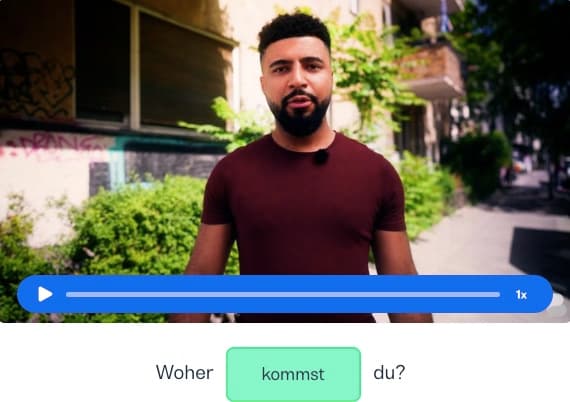I want to learn...
A verb is a word that describes an action, occurrence, or state of being. So, verbs convey what someone or something does, what happens, or the current state of a subject. Now you can already guess that they are essential for constructing sentences. Conjugation means to change the form of a verb to express things like tense, mood, voice, person and number. In German verb conjugation, there are certain patterns to follow in order to use the correct forms. It’s important to familiarize yourself with how to apply them.
In this overview, we’ll cover German verb classes and basic present, past and future tense conjugations so that you can start conjugating verbs in German with confidence.
German verb classes
As in English, German verbs can be classified as regular, irregular, or mixed. You will usually know how to conjugate German verbs based on their class and the personal pronoun being used in the sentence.
| English pronoun | German pronoun |
|---|---|
| I | ich |
| you | du (singular informal) |
| he/she/it | er/sie/es |
| we | wir |
| you | ihr (plural informal) |
| they | sie (they) / Sie (formal you - singular or plural) |
Conjugating regular verbs in German – present tense
Conveniently, the conjugation patterns for regular German verbs in the present tense are the same nearly every time, and it’s helpful to know that in German we only have four different verb endings:-e, -st, -tand-en.
There are two basic steps to correctly conjugating regular verbs in the present tense.
Start with the verb’s infinitive. This is the form you’ll see when you look it up in a German dictionary. A few examples are:packen, gehen, reden, hageln, bügeln, klettern.
For regular verbs, drop the ending, which is either-en, -eln, or -ern, to get the so-called stem.
For packen (to pack) it would be pack-, for gehen (to go) it would be geh- and for reden (to talk) it would be red-.
For verbs ending in -eln and -ern, you only drop the last-n. If we take the word hageln (to hail), the stem would be hagel-; for bügeln (to iron) it would be bügel-, and for klettern (to climb) it would be kletter-.
Accordingly, “I pack” would bei ch packe, “I walk” would be ich gehe, “I talk” would be ich rede, “I iron” would be ich bügele, and “I climb” would be ich klettere, and so on.
Tip: Looking for more grammar tips? Check out our guide to
| English | Infinitive | Ich | Du | Er/sie/es | Wir | Ihr | Sie/Sie |
|---|---|---|---|---|---|---|---|
| to make | machen | mache | machst | macht | machen | macht | machen |
| to clap | klatschen | klatsche | klatschst | klatscht | klatschen | klatscht | klatschen |
| to dance | tanzen | tanze | tanzt* | tanzt | tanzen | tanzt | tanzen |
| to sing | singen | singe | singst | singt | singen | singt | singen |
| to jump | springen | springe | springst | springt | springen | springt | springen |
*As the verb tanzen has a stem ending on z we omit the s before the t.
Conjugating irregular verbs in German – present tense
Irregular German verbs are a bit trickier to conjugate than regular ones. Because there are no patterns for you to follow, and the stems may vary from the infinitive form, it’s best to try and memorize these.
Here is a tip: When you already know your English irregular verbs, you can take educated guesses that their German equivalent is irregular, too. In many (not all!) cases you will be on the right track.
A great many of the “important” and most common verbs are irregular.
Here are six commonly used ones:
sein (to be)
haben (to have)
essen (to eat)
werden (to become, to turn into)
wollen (to want)
können (can, to be able)
Occasionally, you’ll notice a few patterns that are similar to regular verb conjugations, but know that these irregular verbs don’t follow any particular logic. Take the German irregular verb haben (to have), for example.
Haben(to have) conjugation: Present tense
Fortunately, the verb haben has the same endings as regular verbs when we conjugate it in the present tense, but we have to recognize and memorize a particularity that makes this verb irregular: the du form and the er/sie/es form don’t have a “b”*.
| Pronoun | Haben (to have) |
|---|---|
| ich (I) | habe |
| du (you) | hast* |
| er/sie/es (he/she/it) | hat* |
| wir (we) | haben |
| ihr (you) | habt |
| sie/Sie (they/formal you - singular or plural) | haben |
Haben (to have) is also used in many common, fixed expressions that are key to sounding like a native speaker:
Ich habe Hunger. (Literally: I have hunger.)
Ich habe Durst (Literally: I have thirst.)
Ich habe Lust auf... (Literally: I have a craving for…)
Hast du Lust auf Urlaub? (Do you feel like going on vacation?)
Conjugating German verbs – past tense
In order to conjugate verbs in the Perfekt (past tense), we need either haben (to have) or sein (to be) as the auxiliary or helper words and grammatical structure called the Partizip II (past participle).
Conjugation of werden
| Pronoun | Werden (will) |
|---|---|
| ich | werde |
| du | wirst |
| er/sie/es | wird |
| wir | werden |
| ihr | werdet |
| sie/Sie | werden |
| Pronoun | Conjugation of werden + schlafen (to sleep) |
|---|---|
| ich | ich werde schlafen (I will sleep) |
| du | du wirst schlafen (you will sleep) |
| er/sie/es | er/sie/es wird schlafen (he/she/it will sleep) |
| wir | wir werden schlafen (we will sleep) |
| ihr | ihr werdet schlafen (you will sleep) |
| sie/Sie | sie werden schlafen (they will sleep) / Sie werden schlafen (you – formal, singular and plural) |
Let’s look at a few other examples:
Thomas wird nach Dortmund fahren. (Thomas will drive to Dortmund.)
Das Paket wird morgen ankommen. (The package will arrive tomorrow.)
Das Mädchen wird heute Abend aufräumen. (The girl will clean up tonight.)
You don`t need to worry too much about the future tense as you’ll mostly encounter it in written German. Native Germans usually use the present tense to talk about general events in the future. Topic and context will make clear that they talk about the future:
Jürgen geht morgen ins Kino. (Jürgen is going to the movies tomorrow.)
Tabea erzählt ihm nachher eine Geschichte. (Tabea is going to tell him a story later.)
This version of expressing a future event is much simpler to follow, and you’ll get the hang of it quite quickly.
Conjugating German verbs: Recap
Now we’ve covered the basics of German verb conjugations, from regular to irregular verbs and conjugation patterns concerning the present, past and future tenses.
While there’s more to learn, you can now start practicing using German verbs in your everyday conversations.
Repetition and memorization will help you use verbs more confidently, and practicing them with common German phrases will get you far!
Why not keep practising today?
Newlanguages


